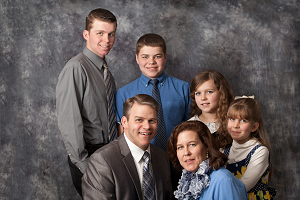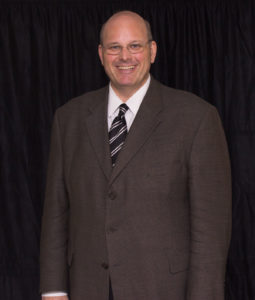 For the next few months, Bro. John O’Malley will be sharing with us from his book, Overcoming Your Devotional Obstacles. We know that everyone can use some encouragement to stay in the Word of God on a daily basis, and we hope these articles will be a blessing to you in your walk with the Lord.
For the next few months, Bro. John O’Malley will be sharing with us from his book, Overcoming Your Devotional Obstacles. We know that everyone can use some encouragement to stay in the Word of God on a daily basis, and we hope these articles will be a blessing to you in your walk with the Lord.
The Obstacle of Time: I want to read the Bible, but I just do not have enough time in my day to have memorable or meaningful Devotions.
The more I speak to others about their time alone with God, the more I learn I am not alone. Many of us struggle with making time for God; we tell ourselves we do not have enough time. We make excuses. We justify why we have not done it. We give our time to the right things and necessary things; we surrender to our schedules and obligations. We often cannot find a way to fit God into our day. We hate it, but it is the reality of most days.
We cannot add time to our lives. We have what is the time allotted for this vapor of a life. We use phrases like, “I need to make the time. I wish I had the time; I did not spend my time on this; or time is not my friend today.” However, we know all of them are expressions spoken out of frustration.
When we say we do not have enough time in the day to have a Quiet Time with God, how much time should we reserve for Him? The often thought yet unspoken sentiments say, “How much time is ‘enough’ to say I did my Devotions? How long do I need to give Him? How much time should we plan on spending with God for a meaningful experience?” We will say to justify our heart’s emotion, “I have things I have to do. I do not have a lot of time just to sit still. I have kids, tasks, appointments, and obligations that are calling me.”
How is it that we willingly schedule appointments in our lives for everything that meets an emotional need in our lives? We schedule time for work because we trade our life’s hours for dollars. We schedule time for play because we sell our time for momentary happiness. We plan time for the academic institutions in our lives because we exchange time for academic credentials. We plan time for the church because we are willing to trade our time for fellowship and ministry.
The Psalmist said in Psalm 63, he sought God early in the day. He pointed to the human condition of hungering and thirsting to be with God. He speaks of how his vision, praise, and memories are affected when he spends time with God. He spoke of how his rest was directly related to his spending time with God.
When we do not spend time with God, we deplete ourselves. We deplete our peace, joy, and strength. When limiting our access to time with God, we tend to lean on our own understanding; we are filled with doubts, and we consult our own heart instead of the mind of God (Proverbs 3:5-6).
When it comes to our personal time with God, we allow other things to intercept our time. We feel sorry for it, yet it happens. We want to do better with it, but we still let it happen. Why? I believe it is not about wishing, wanting, having, or making more time. It is about making a reservation in your day to meet God.
Making a reservation to meet God is about assigning a specific time to your day. It is about saying no to everything that cries out for your day. It is about saying God is the most important relationship in your life and treating Him as such. Scheduling time with God is not on His schedule. It is about your schedule. If you are going to have a meaningful time with God you must:
1. Determine your best time of day–a time when you are not distracted by the day. The Psalmist David said he sought the Lord early in the day. You know your schedule and your best time.
2. Make an appointment with God–a time not shared with anything or anyone else. Consider the appointment as exclusive access to the Creator of the universe.
3. Reserve time for reflection–a time where you process and assimilate what you read. It is not enough to accomplish a chapter reading or time spent reading without reflection. Reflection implies there is a certain glow or image that the Word of God casts on us. If I do not take time for reflection on my reading, I am just checking off a box on my things to do list.
4. Reserve time to listen–the Bible is God’s letter to us. Read to hear the voice of the Author. Learn to understand the tone of His voice. Learn to listen to the message of the words. Jesus said that His sheep know, hear, and follow His voice. Your time with the Lord is about listening. God’s Word is the answer to every human need. Read not to accomplish book or chapter count. Read and listen.
5. Reserve time to speak with Him–at the end of your reservation with Him, share with Him your heart’s difficulties and desires. He calls us to come to Him when we are weak; He urges us to pour out our hearts to Him.
Right now, look at tomorrow’s schedule. What is more important than meeting God? Now, make a reservation with yourself to have time alone with God. Yes, a reservation.
How much time will you need? Schedule ten minutes where you will shut the world out and sit with God and listen to Him. You may have to go outside. You may need to sit in your car. You may need to close a door. Do what it takes to make a reservation to meet Him.
1. Read one passage of Scripture. Start with a Psalm; look for His reflection in that passage.
2. As you read the verses, remember you may need to read it several times to hear His voice and get a sense of the message of His words.
3. Pause in prayerful reflection and say, “God, this is what I hear in your passage. Is there more you want me to see, learn, or know?”
Reserving ten minutes with God will change your day, your heart, and your outlook. Then in the following weeks, as you are comfortable doing so, increase the time you reserve with Him to fifteen minutes each day. There is not a Biblical standard for minutes spent with Him. I am suggesting a ten-minute reservation with God to get you started.
You will not want to miss what He has planned for you tomorrow in His Word. It will change your life.
Meet Him early. Meet Him often. Meet Him regularly. There is no substitute with your daily reservation with God.
If these thoughts have been an encouragement to you, you can email Bro. O’Malley here to let him know. If you’d like to purchase the entire Overcoming Your Devotional Obstacles book in PDF, Kindle, or iBooks format, click here.





